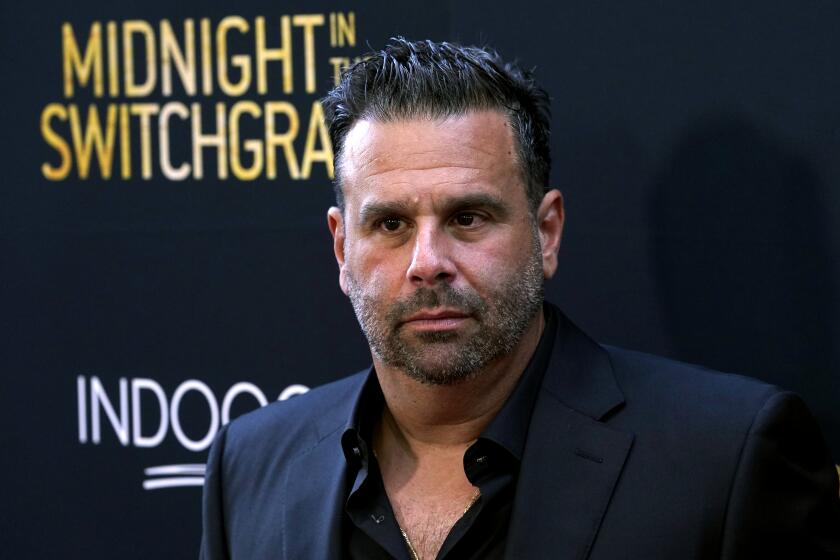MOVIE REVIEW : ‘Alice’ Provides a Pleasant Interlude in Woodyland : Movies: This is Mia Farrow’s 11th film for director Woody Allen. It’s one that might be considered a piffle, but it’s a charming piffle.
- Share via
Woody Allen makes so many movies without a break that you get the feeling he would spontaneously combust if he took a breather. Sometimes, as with “Hannah and Her Sisters” and “Crimes and Misdemeanors,” he latches on to a real subject; more often, in films like “September” and “Another Woman,” he seems to be making a movie for no other reason than to keep active.
“Alice,” Allen’s new film, is most definitely not one of his weightier escapades. (It’s rated PG-13 for occasional strong language and adult situations.) It doesn’t pump itself up with Bergmanesque pretensions. Still, if it’s piffle, it’s charming piffle. It has some of the same tiny, companionable pleasures as his short episode for “New York Stories.” Allen probably regards these movies as interludes between his “real” serious work. But working in a minor, throwaway mode brings out his comic side. The weightlessness gives his jests a real lift.
Besides Bergman, Allen has often been accused of aping Fellini, and it can be argued that, if “Stardust Memories” was his “8 1/2,” then “Alice “ (throughout San Diego County) is his “Juliet of the Spirits.” It’s about a pampered, vaguely dissatisfied New York housewife, Mia Farrow’s Alice, whose active fantasy life becomes indistinguishable from her reality. Visiting a Chinese herbalist-acupuncturist (Keye Luke) for back pains, she pours out her life’s yearnings to him under hypnosis. The potions he prescribes gives her the oomph to approach a divorced father (Joe Mantegna) at her daughter’s school; another remedy allows her, and him, to become invisible.
Mia Farrow has been in so many of the Woodman’s movies--this is her 11th--that it might seem she’s in danger of becoming a generic Allen heroine. Allen tends to use the same actors over and over again in the same ways, and Farrow at this point in her career has the double disadvantage of appearing in the films of virtually no other director. That seems a shame, both for her and for the many other gifted directors whose universes she could comfortably fit into.
But Farrow is usually at her best in Allen’s movies, even though she often seems to be mimicking Allen’s own nattering mannerisms. He brings out a plaintive, starry-eyed humor in her. Her role in “Alice” is all-of-a-piece with her movie-infatuated dreamer in “The Purple Rose of Cairo.” Like that character, Alice seems almost too fragile for this world. And her world in “Alice” is a wonderland of sleek East Side high-rises and fancy boutiques.
It makes sense that, when she wants to transcend her troubles, she gravitates to Chinatown, which Allen presents as a funky, cloistered hideaway. The sheer foreignness of Chinatown is a clue to its hold on Alice. In her sessions with Keye Luke’s Dr. Yang, Alice drops her elfin composure and lets a beseeching quality come through. She yearns to be mesmerized and brought out of this world.
Alice needs Dr. Yang’s potions because, unaided, she’s inhibited with guilt. Allen in the past has stocked his comedies almost solely with Jewish humor; when he wants to get serious he gravitates towards Gentile themes. “Alice,” however, is a comedy about, among other things, Catholic guilt. And the surprise--the joke--here is how much like Jewish guilt it is. Comedy for Allen has become the great unifier.
Alice masks her adulterous waverings by re-imagining herself as a saint. She and her husband (William Hurt, in a cameo) attend a dinner in honor of Mother Teresa, and you can see how Alice’s fantasies of sainthood make her eyes shine. Mother Teresa is Alice’s idea of her own best self--giving and guilt-free. If there’s something a little ridiculous in the notion that a pampered, moneyed housewife would have such fantasies, there’s also something poignant about it. Farrow never truly looks like she belongs in her gentrified world anyway. She’s too waifish, too willing to be entranced.
Allen invests so much of this movie in Farrow that, with the exception of Keye Luke, who seems to be having a high old time, the rest of the cast recedes into the background. That’s a shame, because the film is stocked with wonderful actors in bit parts: Besides Hurt, Bernadette Peters turns up as a fairy godmother-type muse; Judith Ivey has a few moments as a gossipy friend; Judy Davis has a whammo couple of minutes; Blythe Danner plays Alice’s sister, and Cybill Shepherd, Bob Balaban, David Spielberg, Julie Kavner, Alec Baldwin and Gwen Verdon also put in appearances.
Allen may want to have these people in his movie to tone things up. Or maybe he just liked having them hang around the set. They must like it too. After all, what other director could assemble such a cast for so little? Still, these actors are too talented and memorable for the cameos they’re called upon to deliver. Their presence throws the movie out of whack.
Much of “Alice” is pleasantly out of whack anyway. Allen may consider “Alice” to be a minor jest before his next Big One, but there are pleasures in its small-time ambitions that sometime elude him on his more ambitious projects.
‘Alice’
Mia Farrow: Alice
Joe Mantegna: Joe
William Hurt: Doug
Keye Luke: Dr. Yang
A Jack Rollins and Charles H. Joffe production, released by Orion Pictures. Director Woody Allen. Producer Robert Greenhut. Executive producers Jack Rollins and Charles H. Joffe. Screenplay by Woody Allen. Cinematographer Carlo Di Palma. Editor Susan E. Morse. Costumes Jeffrey Kurland. Production design Santo Loquasto. Art director Speed Hopkins. Set decorator Susan Bode. Running time: 1 hour, 46 minutes.
More to Read
Only good movies
Get the Indie Focus newsletter, Mark Olsen's weekly guide to the world of cinema.
You may occasionally receive promotional content from the Los Angeles Times.










